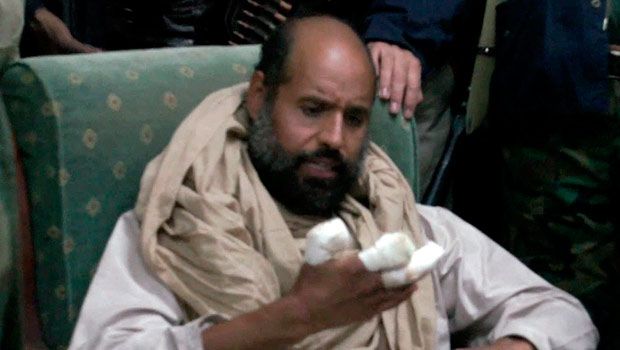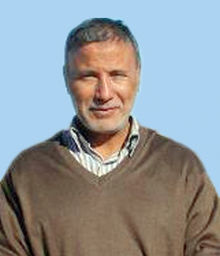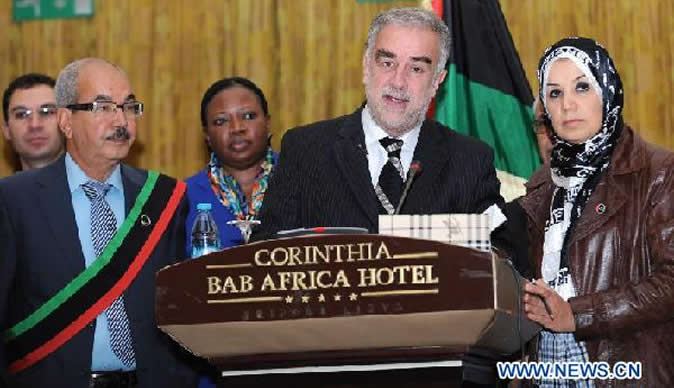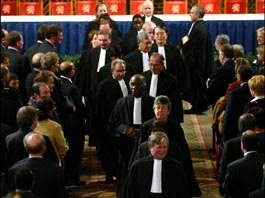Prosecutor Ocampo’s visit this week to Libya raised eyebrows when he suddenly announced that the ICC would not invoke its UNSC granted power and proceed with Case # ICC 01/11
Zintan, Libya
Despite the claims of the current new government in Libya that Seif al Islam Gaddafi, the apprehended subject of an International Criminal Court arrest warrant that ordered his transport to The Hague, is in a secure hidden location near Zintan, Libya, a town approximately 85 miles southwest of Tripoli, it is not the case.
 |
| Seif al-Islam looks at his injured fingers just after his capture |
Dr. Andrei Murakhovsky: Gaddafi son needs surgery on gangrenous fingers
only a small part of his thumb and index finger needed to be removed. (Reuters)
 Neither are the assurances by Steven Anderson, spokesman for the International Committee of the Red Cross (ICRC) who on 11/23/11 announced that Seif al-Islam's injuries had been "taken care of” or Mr. Anderson’s tendering of profuse assurances that Seif is in good health. In point of fact, following the ICRC assurances, the Ukrainian born Doctor Andrei Murakhovsky who lives in Zintan reported that “Seif’s wound is covered with gangrenous tissue and necrotic tissue.” He added that "This wound is not in good condition and requires amputation. His index finger has been ripped off at the level of the middle phalange (finger bone), the bones are all shattered. It's the same thing with the thumb of that hand.” Dr. Murakhovsky told the Reuters news service. The morning of 11/24/11, Libyan Prime Minister Abdurrahim El-Keib still insisted that “Seif al-Islam is receiving the best possible treatment, but for now he is not in the hands of the provisional central government and we don’t know where he is.”
Neither are the assurances by Steven Anderson, spokesman for the International Committee of the Red Cross (ICRC) who on 11/23/11 announced that Seif al-Islam's injuries had been "taken care of” or Mr. Anderson’s tendering of profuse assurances that Seif is in good health. In point of fact, following the ICRC assurances, the Ukrainian born Doctor Andrei Murakhovsky who lives in Zintan reported that “Seif’s wound is covered with gangrenous tissue and necrotic tissue.” He added that "This wound is not in good condition and requires amputation. His index finger has been ripped off at the level of the middle phalange (finger bone), the bones are all shattered. It's the same thing with the thumb of that hand.” Dr. Murakhovsky told the Reuters news service. The morning of 11/24/11, Libyan Prime Minister Abdurrahim El-Keib still insisted that “Seif al-Islam is receiving the best possible treatment, but for now he is not in the hands of the provisional central government and we don’t know where he is.”
 |
|
Osama Al-Juwali, head of the military council in Zintan, after forces under his command captured Seif al-Islam, was given the defense job as part of a cabinet line-up in which secularist liberals were dominant and which had no key roles for the Islamists |
Regarding Seif al Islam’s “secure and hidden location”, foremost people in the village of Zintan it is known where Seif al Islam is being held as it is to this observer who visited a motley group of B western movie types who are currently guarding and “protecting” Seif. Although armed with a Power of Attorney from one of Seif’s family members to visit him, the group refused my entreaties to visit Seif with the excuse that they had to consult their commander who was not expected to return for a few days since he was now the new Libyan Defense Minister.
On the question of Seif’s health, there is increasing concern also because his guards claim they cannot take him to Zintan's only hospital because someone would likely kill him in order to collect on the substantial rumored Qatar/NATO offered cash reward for whoever assassinates him thus presumably helping “the new Libya” and its allies avoid a “messy trial”.
 Meanwhile, after what he claims in a change of heart, the International Criminal Court Prosecutor agrees that Libya, not The Hague, is the best place after all for Seif al Islam and his trial. Since its establishment by the United Nations in 2003, the ICC has had just one Prosecutor, Luis Moreno-Ocampo. To the reported expressed relief of many international defense lawyers, several ICC staff and ICC judges, plus legal commentators familiar with his prosecutorial work, the ICC will have his successor chosen next month in New York. This coming weekend in New York, the legal defense organization, Advocates Sans Frontiers (ASF) will meet in order to try to agree on a successor to propose to the 18 ICC Judges who will decide.
Meanwhile, after what he claims in a change of heart, the International Criminal Court Prosecutor agrees that Libya, not The Hague, is the best place after all for Seif al Islam and his trial. Since its establishment by the United Nations in 2003, the ICC has had just one Prosecutor, Luis Moreno-Ocampo. To the reported expressed relief of many international defense lawyers, several ICC staff and ICC judges, plus legal commentators familiar with his prosecutorial work, the ICC will have his successor chosen next month in New York. This coming weekend in New York, the legal defense organization, Advocates Sans Frontiers (ASF) will meet in order to try to agree on a successor to propose to the 18 ICC Judges who will decide.
Prosecutor Ocampo’s visit this week to Libya caused some raised eyebrows among the four groups noted above when he suddenly announced that the ICC would not invoke its UN Security Council granted
 |
| Ocampo, the Chief Prosecutor of the International Criminal Court (ICC), attends a joint press conference after meeting with Libya's Interim Justice Minister Mohammed al-Allagui in Tripoli, capital of Libya, on Nov. 23, 2011. |
power and proceed with Case # ICC 01/11. This case was opened at the ICC on March 3, 2011, having been assigned to the ICC by the UN Security Council following the preceding months uprising in Benghazi, Libya.
Speculation among some in The Hague, in Libya and from ASF lawyers is that knowing that he would not be re-elected for another term as ICC Prosecutor, due to among other reasons he has not won one case during his 9 year term, has repeatedly incurred the wrath of ICC judges for bringing cases which they ruled lacked sufficient evidence and his penchant for self-aggrandizing publicity and making inaccurate claims about cases and defendants that border on judicial misconduct, Ocampo decided to switch horses.
One egregious example of his making false representations is the current ICC case involving Seif al-Islam Gaddafi in which Ocampo made several inaccurate headline grabbing statements over the past several weeks claiming to be negotiating “indirectly” with Seif al Islam to give himself up to the ICC. Seif has emphatically denied Ocampo’s grandstanding claims and presumably, were Ocampo to attempt to personally prosecute his case Seif’s legal team would immediately file a motion to replace Ocampo for cause, as provided by ICC rules.
Seif al-Islam Gaddafi in which Ocampo made several inaccurate headline grabbing statements over the past several weeks claiming to be negotiating “indirectly” with Seif al Islam to give himself up to the ICC. Seif has emphatically denied Ocampo’s grandstanding claims and presumably, were Ocampo to attempt to personally prosecute his case Seif’s legal team would immediately file a motion to replace Ocampo for cause, as provided by ICC rules.
Given these problems, Ocampo, according to someone who accompanied him during his visit this week to Libya, decided to accept a lucrative offer from the NTC to advise the oil rich country on setting up a legal system to try Seif al Islam and others.
The facile assurances by Moreno-Ocampo, NATO officials and American UN Ambassador Susan Rice that Libya is currently fully capable of currently handling trials of former regime loyalists are nonsense. Rice exhibited ignorance and surprise here last weekend when she claimed not to know that Libya had the death penalty and would apply the death penalty in the ICC case if given the chance. The Libyan public’s apparent preference for the death penalty by hanging in the two Libya ICC cases, as was the case with Rwanda, is one reason the Ruanda Tribunal did not allow the government of Rwanda to conduct certain trials even though that government assured the UN it would not actually carry out a death penalty sentence. Libya has offered no such assurances to the ICC against the use of the death penalty nor has it submitted a legal challenge to ICC jurisdiction over the Seif al Islam or Abdullah Sanussi cases, as the Rome Statute requires.
From its formation last March to the present, NTC statements and assurances on most subjects have been proven false. In addition, NTC claims that the ICC involvement in the Gaddafi and Sanussi cases amount to European neo-colonialism in Africa are not convincing given the fact that the ICC has 119 member plus the law its applies is international and several recent ICC case filings have nothing to do with Africa.
Despite switching jobs, Ocampo has not lost interest in prosecuting the Seif al Islam case which he views as his best chance of finally winning at least an ICC related case, but not at The Hague where there is real doubt that Seif could be convicted given Court rules of procedure and ICC legal staff resources that would actually assist an accused in presenting his defense before the court. Ocampo is said to be betting on gaining a victory in Seif’s high profile case by working with the NATO created NTC government in Libya and running the prosecution as a behind the scenes “consultant” and helping the New Libyan government keep the UN and ICC at bay while allowing the NTC to try both Seif’s case and that of Abdullah Sanussi if and when the latter is proven to have been captured. Ocampo is said to relish the job of becoming the “Father of Libya’s new legal system.’ Mr Ocampo is now explaining that it was never his role “to tell Libyan officials how to hold a fair trial and the standard of the ICC is that it has to be a judicial process that is not organized to shield the suspect and I respect that it's important for the cases to be tried in Libya.” He then added, "There are so many different traditions, it is difficult to say what is fair."
No sooner had the surprising news and Ocampo’s sudden vagueness about what constitutes a fair trial begun to ricochet around the Internet than this observer received an email from an International criminal lawyer whose office is two blocks from the Carl Moultrie Courthouse in Washington, DC. The American lawyer was appalled: “Paying Ocampo as a consultant for the new Libyan government on criminal trial procedures is a ridiculous thought/idea. He has no idea of fair trial rights and has not achieved a conviction in his nearly 9 years at the ICC.”
 Nor were the ICC Judges thrilled at the perceived betrayal. The ICC quickly fired off a reminder to Ocampo, to the new Libyan government and the media that it is the ICC Judges, and not the ICC Prosecutor, who will decide whether a case will be held in The Hague or if the country where the alleged crimes occurred and only they will decide if Libya has ability to conduct a fair trial. The ICC is signaling that the Ocampo generated international headlines to the contrary notwithstanding, the issue of trial venue in Libya has not settled in ICC case # 01/11.
Nor were the ICC Judges thrilled at the perceived betrayal. The ICC quickly fired off a reminder to Ocampo, to the new Libyan government and the media that it is the ICC Judges, and not the ICC Prosecutor, who will decide whether a case will be held in The Hague or if the country where the alleged crimes occurred and only they will decide if Libya has ability to conduct a fair trial. The ICC is signaling that the Ocampo generated international headlines to the contrary notwithstanding, the issue of trial venue in Libya has not settled in ICC case # 01/11.
Prosecutor Ocampo knows well that once the ICC decides to open an investigation of a case, national courts may not investigate that case and are relieved from their obligation to do so. In addition, since the ICC has issued an arrest warrant against Libyan defendants, all states – including Libya - are obliged to cooperate fully with the Court.
Following the public dressing down from The Hague, Ocampo has now retreated a bit and told CNN on 11/23/11 that: “ The only condition is the new Libyan government has to present their position to the International Criminal Court judges and the judges will decide if the case can be prosecuted in Libya. Libya will present evidence to ICC judges that the country can hold the trial, and the judges will decide if they are satisfied”, Ocampo explained.
In some ICC cases, specifically Rwanda, the Judges refused to allow the country which under normal circumstances would have automatically been granted case venue per the Rome Statute because they found that the concerned country did not have the quality of a criminal justice system that would likely produce a fair and impartial trial.
Issues raised in the Rwanda case that convinced that International Tribunal not to send defendants to that country for trial are today applicable in Libya.
The ICC, if it takes up the question as expected, should rule in the developing Seif al Islam case, precisely as the International Criminal Tribunal for Rwanda found in ruling against that country’s request for trial jurisdiction, although like Libya today, Rwanda claimed to have “modern functioning court system.” The reason is that an initial review of Libya’s criminal judicial system and discussion with Libyan criminal defense lawyers as well as international criminal defense lawyers with years of experience in international tribunals practice, that it is very clear that persons accused of serious crimes in Libya currently do not have even the most minimal judicial rights that are required by international norms acceptable to the international community.
Today is Libya defendants do not enjoy adequate legal representation, financial support for indigent accused, travel and investigation support for defense teams, security for defense teams, and Libya’s central and local governments place impediments curtailing defense teams in the discharge of their functions.
An admittedly to date cursory inquiry in Libya among lawyers here also reveal nonexistent or inadequate accommodation and transport arrangements for witness to Libya, as well as a lack of arrangements for protection of witnesses before, during and after testifying in court. In addition, the new government is engaging in a pattern of threaten potential witnesses preparing to testify against NATO in another case, and the new government in Libya is failing to provide safe and secure travel for Libyan witnesses living abroad including in Algeria, Tunisia, Mali, Niger, and Egypt. Interviews with Libyan lawyers and officials as well as visits to detention facilities in Libya reveal that conditions are not in compliance with international standards and that widespread torture of prisoners in Libya and threats against the families of prisoners are equal to or worse than during the previous regime.
One can wish Luis Moreno-Ocampo good luck in his new career as would be “Father of the New Libya’s Legal system,” but the current ICC case # 01/11 is too critical for all involved to wait until his project is complete and meets international standards.
 |
Franklin Lamb is doing research in Lebanon. He is reachable c\o fplamb@gmail.com He is the author of The Price We Pay: A Quarter-Century of Israel’s Use of American Weapons Against Civilians in Lebanon. Dr. Lamb is Director, Americans Concerned for Middle East Peace, Wash.DC-Beirut Board Member, The Sabra Shatila Foundation and the Palestine Civil Rights Campaign, Beirut-Washington DC |